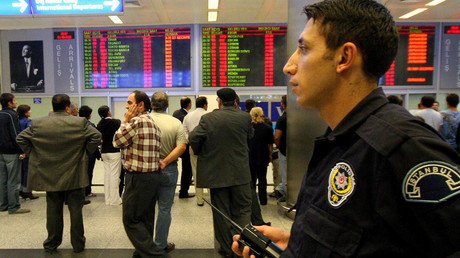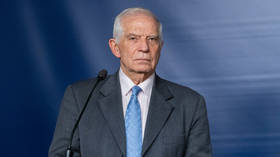Erdogan announces 3-month state of emergency in Turkey after coup attempt
A state of emergency will be introduced in Turkey for three months following a coup attempt last week, President Recep Tayyip Erdogan announced on Wednesday.
LIVE UPDATES: Post-coup crackdown in Turkey
Speaking in a live broadcast address following a meeting with the National Security Council in the capital of Ankara, the Turkish leader said the decision was not against the rule of law, and did not violate any democratic freedoms.
"The purpose of the state of emergency is to most effectively and swiftly take steps necessary to eliminate the threat to democracy in our country," he said, as cited by Anadolu Agency.
Erdogan claimed the coup attempt might not have ended and there could be “more plans” to forcefully seize power in the country, AFP reported.
He added that European states have no right to criticize the decision to declare a state of emergency.
Earlier in the day, the Turkish president told French Foreign Minister Jean-Marc Ayrault “to mind his own business,” after the French warned Ankara about the crackdown that followed the failed coup. “If he wants a lesson in democracy he can very easily get a lesson in democracy from us,” Erdogan said in an interview with Al Jazeera, as cited by AFP.
Erdogan said the ongoing “cleansing” operation in the country, implemented to punish attempted coup plotters and supporters, would continue, adding that he is working with the armed forces to rid Turkey's military of the “virus.”
Speaking to Al Jazeera, the Turkish leader said he and his government would not let the “minority” dominate the “majority”. “As long as we join hands and accompany the people, the tanks can do nothing,” he said.
The state of emergency will come into force after it is published in Turkey's official journal, Resmi Gazete, Reuters reported.
Under the emergency measure, the Turkish president and his ministers are allowed to bypass the parliament in passing new laws. Rights and freedoms in the country may also be limited or suspended if the government decides to do so, the news agency explained.
Erdogan is “playing his last card” in an attempt maintain a firm grip of the country and get rid of all dissent, believes Dr. Maged Botros, professor of political science at Helwan University, Greater Cairo.
“Erdogan wants to revive the Ottoman Empire … so internally he needs a very tight grip on the country, on the state, on the branches of government,” Botros told RT. “This is a move beyond repair, this is a divided country, a state of fear. He divided his nation. He’s playing his last card – to get it all or lose it all”.
Erdogan is playing the “hero in front of his people” but at the same time trying to avoid sacrificing his “his long-lasting position in the NATO,” Botros added.
“He is trying to play a hero by confronting the US, confronting a superpower. This is a tactical thing to get [his] hands on Gulen, his main rival, opposition figurehead,” Botros said, adding that Erdogan’s moves of “extortion” also include “threatening” the EU with a flow of migrants.
The military’s attempt to seize power in the country took place on July 15, when Erdogan was on holiday in the Turkish resort of Marmaris. Thousands of people took to the streets of Ankara and Istanbul. Erdogan said that 246 government supporters were killed. At least 24 coup plotters were also killed, officials said.
Tens of thousands have already been detained or lost their jobs following the failed coup, with some 60,000 people suspected of backing the coup attempt being investigated. The large-scale purge of state institutions has affected judiciary officials, civil servants, law enforcement and education workers.
Erdogan and the government have accused the Muslim Pennsylvania-based cleric Fethullah Gulen of orchestrating the coup attempt, and demanded his extradition from the US.













